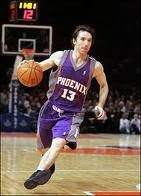 "Only Just A Minute"
"Only Just A Minute"I met Felicia Hall Allen when she came to work with our program here at UCF in our first season here 3 years ago. We had 10 freshmen and we were a new staff. Our players who are now rising seniors still talk about that first meeting and the influence she had on them. Of course they enjoy bringing up the "follow the leader dance exercise" that she leads each session.
But I didn't realize the impression she had made until one of our players before a game this season (2009-10) recited the following poem that Felicia had used when she spoke to our team during the (2008-09 season). We were emphasizing one possession at a time and playing in the present. Then she stepped up and quoted the anonymous poem, "Only Just A Minute"
I have only just a minute,
Only sixty seconds in it.
Forced upon me, can't refuse it.
Didn't seek it, didn't choose it.
But it's up to me to use it.
I must suffer if I lose it.
Give account if I abuse it.
Just a tiny little minute,
But eternity is in it.
That's when I knew she had impacted our team. I am looking forward to the conference for the opportunity take advantage of the "minute" that we will have at the symposium.
Felicia has organized the Assistant Coaches Professional Development Symposium.
Speakers include Al Brown (Duke), Bob Starkey (LSU), Stephanie Glance (Tennessee), Tim Eatman (Arkansas), Kelly Bond (Texas A&M), Carlene Mitchell (Rutgers), Lisa Cermignano (Illinois), Jackie Smith Carson (James Madison), Bobby Kelsey (Stanford), Karen Aston (Charlotte), Coquese Washington (Penn State).
Symposium Topics Include
Position Yourself as a Valuable Part of the Program
Think Like a Head Coach
Recruiting..Find the Right Fit
The Art of a Good Practice Coach
Presenting a Scouting Report
Be an Effective Bench Coach
Get more details at:
http://www.feliciahallallen.com/symposium.htm













